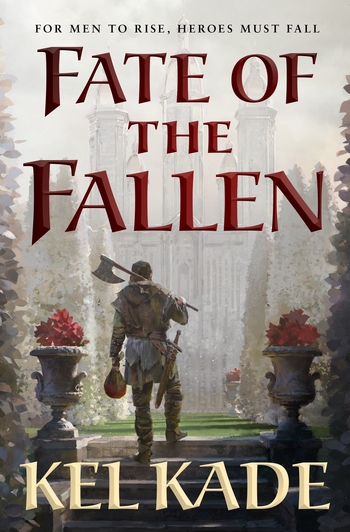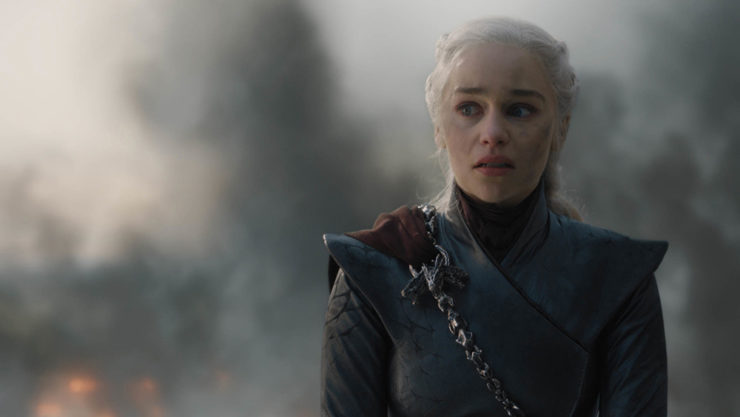George R.R. Martin spent the first three quarters of the first novel in the Song of Ice and Fire series setting up Ned Stark to be the righteous, honorable hero who will sort out the viper’s nest of King’s Landing. Then he dies and we understand, in retrospect, that Ned wasn’t ever subtle or clever enough to be the savior we wanted. The penultimate episode of Game of Thrones, in many ways, played out the ultimate Martin plot: first, spend almost eight seasons showing us the rise of a ruler who has the ability to be truly great and also the potential to fall victim to her worst instincts. Then, at the eleventh hour, when she has a critical choice to make, remind us that people rarely rise to the occasion under pressure. Martin has always been a bitter realist with a dim view of human nature; Benioff and Weiss did not pull any punches in delivering that lesson.
[Please note that there are spoilers through the latest episode below.]
That said, the episode left me feeling a little cold. It was full of moments that were brilliantly acted and deftly written: Jaime and Cersei’s final embrace before their deaths in the bowels of the Red Keep, Tyrion and Jaime’s painful goodbye on the eve of battle, Varys’ sincere and futile hope that his last plot turns out to have been unnecessary. These are all moments that I would have been happy to see play out at the end of the series. I do not disagree, for the most part, with the plotting of these episodes—I just am dismayed by the pacing. More than anything, it’s become clear to me that Game of Thrones needed at least a full season eight. It might have needed a full season seven as well. The plots laid in motion in these last five episodes needed more time build and agitate in order to feel earned.
The show did an excellent job of exceeding even the operatic heights I had expected. The unleashing of the dragons has, up to this point, been a triumphant moment. They have lain waste to warlocks, and slavers, and pillaging armies. The militaristic leitmotif of House Targaryen has been infused with a kind of heroic inevitability. This time around, Daenerys and Drogon as seen from below are played for maximum horror: the innocents of King’s Landing charred into grotesque Pompeiian statuary, the narrow streets turned into fiery death traps, the Red Keep crumbling into spectacular ruin, three hundred years of history and eight seasons of storytelling lost in the conflagration. The show even took the time to show us the relative inefficiency of Cersei’s misrule, with her lonely pockets of cached Wildfire puffing out ineffectual green spurts as the oranges and reds of dragonfire consumed everything in their path.
In the wake of Daenerys’ inferno, the show makes it all but impossible to do anything but sympathize with her victims. I have long been a proponent of Varys, though my piece last week seemed to draw out some debate on whether or not he represented a viable moral code. However you view his previous actions, though, one cannot see his death as something other than an honorable man falling on his sword in order to be true to his values. Cersei, a character detested by most viewers and beloved by a select few, dies in a way meant to be wholly sympathetic within the actual scene. Whatever your views on her villainy through the previous seven seasons, she was critically underused in this last one, and she meets her end in tears, another hapless, unintentional victim of Daenerys’ all-encompassing fury. One might share my qualms about whether or not Jaime’s arc came to a satisfying conclusion (it didn’t) but his multifaceted character gets smoothed over into a figure of pity when compared with the despondent, furious end of the Targaryen line raining apocalypse down on the heart of Westeros. Here, at the end of the show, Daenerys is more a goddess of death than the Night King, and every other character seems to deserve our empathy and grief when silhouetted against the flames.
When Kraznys mo Nakloz sold Daenerys the Unsullied, he emphasized their fanatical loyalty. They would serve whomever held the whip. She used that to her advantage and made sure that her first order was to have them turn on their former masters. At the time, she phrased it as freedom: kill the masters, fight for me because I give you a choice. Grey Worm, in throwing his spear into the chest of a surrendered Lannister soldier puts the lie to her promise. She dropped the harpy whip but kept the dragon one. She claimed to free her soldiers from slavery but used them to murder innocents in much the way the Astapori might have. Her vision in the House of the Undying, which once read as a warning about the coming apocalypse, now seems clearly to have been a vision of her own ascendency—ash instead of snow, fire instead of ice.
I spent the first hour after watching this episode feeling detached. The feeling shared some essential DNA with both anger and sadness, but it was more a species of discomfited melancholy. I had trouble articulating how I felt about the episode to the small group of friends I watched it with. I checked in with some loved ones whose Game of Thrones opinions I deeply value via text message and found them more or less evenly split on loving and hating the episode, though all of them seemed gutted.
Then, in the parking garage of my apartment building, I completely broke down in tears. I did not care for this episode much, but it wasn’t disappointment that caused me to fall apart. Rather, it was the overwhelming sense of an imminent end to this story—a story that I have been enraptured by for most of my life. Whether or not this is the ending that Martin whispered in Benioff and Weiss’ ear a decade ago, whether or not Martin’s ending will satisfy me more than this one seems poised to do, this coming Sunday will be a kind of catharsis I am not sure any work of fiction has provided for me. There will be time afterwards to judge the merits of the show. Once The Winds of Winter and A Dream of Spring are published I’ll be able to compare the two versions and talk about their various merits and pitfalls. But for now, there is only the dread and agita of feeling the walls of a story close in on you…the possibilities winking out, the growing fear that it will end on a note so deeply unsatisfying that you will question whether or not this was time well-spent.
Buy the Book


Fate of the Fallen
So the reign of Daenerys Targaryen, first of her name, Queen of the Andals, and the Rhoynar, and the First Men, Mother of Dragons, Breaker of Chains, Liberator of Slaver’s Bay, Scourge of King’s Landing, seems destined to be a short one. While I would be personally disappointed to see Jon on the throne by the end of the series, I’m unclear on what else the show has set up.
If anything, the clearest foreshadowing in this episode seemed to come from the Hound. Sandor Clegane was maimed, as a child, by his sociopathic brother. That very personal trauma became a living nightmare as the Hound watched his brother become a Knight, a legitimate part of Westeros’ system of nobility and favorite tool of the ruthless Tywin Lannister. It is a special kind of hell to see your childhood trauma spread across the realm itself—the monster under your bed suddenly a threat to every child in every bedroom. In his final battle with his brother, Sandor Clegane puts his sword through the Mountain’s gut, slashes him to pieces, and finally shoves a knife through his eye and into his brain. To his horror, the undead abomination begins to pull the knife out, slowed but unbeaten by every conceivable fatal wound. The only solution is self-sacrifice; the Hound runs his brother off the crumbling stairs of the Red Keep, forcing both of them into the flames a hundred feet below. The Targaryen dynasty seems to be a threat that will not die, another abomination that rose from the dead after the Doom of Valyria to spread the old Freehold’s slavery, madness, and trauma to a new continent. Tyrion and Jon are now in the position of Sandor Clegane—having witnessed (and, in their case, abetted) the rise of monster, they must put an end to it, perhaps at the cost of their own lives.
George R.R. Martin tells stories about the insufficiency of virtue to conquer tyranny. His novels are about the horror that is wrought when we believe a story is true because it is satisfying. Good intentions and noble goals pave the road to fire and blood. This narrative is going to end with pain and horror and perhaps just a vague patina of hope. If we’ve learned anything over the course of the series, monstrously unfair sacrifice is the only path towards breaking cycles of violence and oppression. Just as Mirri Maz Duur told Daenerys in the very beginning: only death can pay for life.
Tyler Dean is a professor of Victorian Gothic Literature. He holds a doctorate from the University of California Irvine and teaches at a handful of Southern California colleges. More of his writing can be found at his website and his fantastical bestiary can be found on Facebook at @presumptivebestiary.










